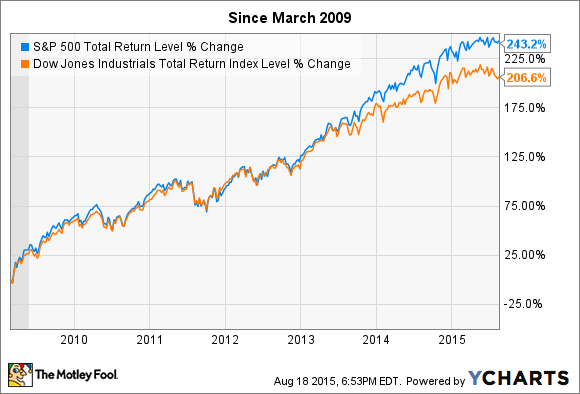How much of your portfolio should be in cash? Many experts say you should be fully invested at all times to maximize gains, and fight inflation, while others advise keeping a stockpile of cash to take advantage of buying opportunities. Both arguments have some merit, so we asked three of our contributors to shed some light on the subject by telling us what they do in their own portfolios.

Image source: Getty Images.
Brian Feroldi: While I certainly understand the merits of keeping a sizable cash position in your portfolio to take advantage of any market corrections, I personally like to be nearly fully invested at all times, and generally keep around 1% of my portfolio in cash.
This may seem like a risky strategy, but when you combine the constant stream of dividend checks that hit my brokerage account each month with my regular cash contributions, I believe that I have access to enough capital to take advantage of any market correction. It's also worth mentioning that I do not use the cash that I keep in my emergency fund to generate this number, so I have a bigger buffer against a downturn in the economy than you might think.
I feel this strategy fits me well, because the market goes up more often than it goes down. Also, because I'm in my 30s with decades of compounding ahead of me, I want to keep my cash position small to reduce its drag on my overall portfolios returns. As I get closer to retirement, I can easily see myself raising this percentage accordingly; but for now, I'm comfortable keeping my portfolio cash buffer small, especially in today's market conditions with so many high-quality dividend-paying stocks on sale.
Jason Hall: Every dollar I don't have invested is a dollar that's losing value to inflation. And because I'll be aggressively adding new contributions on a regular basis for the next 20 years -- I'll add roughly 15% of my portfolio's value in new contributions this year alone -- I don't think it's in my best interest to keep a lot of cash on hand. It's rare that the cash balance in my investing accounts ever exceeds 5%.
While this could mean that I don't have as much "dry powder" set aside for the eventual big market drop -- we get them historically about every seven to 10 years -- it also means I won't miss out on a strong, extended bull market like we've enjoyed during the past six years:
I know I've done better by investing as much as I can on the way up versus sitting on the sidelines -- missing a historic recovery -- waiting for the next downturn.
I guess the best way to describe my approach is this: I don't know when the next market crash will be, but I know when I'm planning to retire. I also know that the long-term return from stocks suggest my best returns will be by investing and holding for as many years as possible.
Matt Frankel: I tend to keep a little more cash around than Jason and Brian, generally between 5% and 10% of my portfolio at any given time. I know (and completely agree with) the central arguments against keeping cash.
First, it drags down returns. If my stocks return 10% this year, but one-tenth of my portfolio is in cash, my overall return gets knocked down to 9%. This doesn't sound like much, but can certainly add up over time. Also, cash actually loses value to inflation over time, producing negative real returns.
However, I feel that the good reasons to keep cash greatly outweigh the bad -- especially now. Stocks aren't exactly "cheap" right now, and keeping some cash on the sidelines will allow me to take advantage of opportunities as they present themselves.
I'm not talking about trying to time the market here, but to be able to pounce when stocks you like become more attractive due to a market correction, sector weakness, or any other factors. Warren Buffett was pretty vocal about aggressively buying stocks during the financial crisis, and even though he didn't know where the bottom would ultimately be, he saw an opportunity that his cash allowed him to pounce on.
If a market correction comes soon, as many experts predict, I'll be glad that I kept a "war chest" of cash to take advantage of it.





